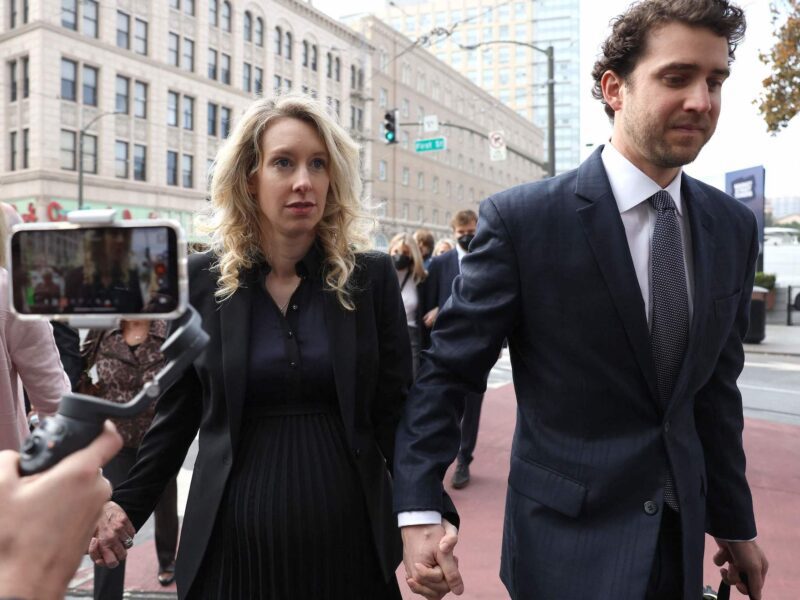
Who is Elizabeth Holmes? Inside the stranger-than-fiction Theranos fraud case
Who is Elizabeth Holmes? At different times, many would give you very different answers. After she founded a medical technology startup that was valued at nearly $10 billion, many would have said she was a genius, a self-made billionaire, and a brilliant entrepreneur.
Now, if you were to ask who Elizabeth Holmes is, the answers will sound very different. She was allegedly guilty of fraud, lying to stockholders, and misrepresenting the efficacy of her company’s medical technology, potentially putting people’s health in jeopardy.
So who is Elizabeth Holmes really? Learn the facts about her stunning rise & fall.

Theranos
Elizabeth Holmes founded a company called Real-Time Cures after dropping out of Stanford’s School of Engineering in 2004.
The company’s purpose was to perform blood tests using significantly smaller amounts of blood. Though many at Stanford were skeptical, Holmes was able to attract investors to fund the project. She changed the name of the company to Theranos.
Holmes’ company claimed to have developed a device capable of automating miniature blood tests. The Theranos blood testing machine was dubbed “Edison” and required only a finger prick to deliver results. Some shared doubts about the efficacy of the device, as Theranos initially refused to allow Edison to be peer-reviewed.

Theranos quickly built an impressive base of investors & board of directors. Tim Draper, a venture capitalist who invested in Tesla, SpaceX, Robinhood, and Twitch, among many other businesses, was one of Theranos’ first major backers. Other early investors included Rupert Murdoch, the DeVos family, and the Walton Family. Members of Theranos’ board included Henry Kissinger, James Mattis, Bill Frist, and George Shultz.
In 2013, Walgreens entered into a partnership with Theranos to bring their lightweight blood testing machines into stores. Theranos entered into many agreements to provide blood testing services to healthcare providers in a number of different states. In 2014, Theranos was given an estimated valuation of around $9 billion.

Downfall
While many were enthusiastic about Theranos’ claims of making medical diagnoses infinitely more simple, the medical community remained skeptical. Eleftherios Diamandis, a professor at the University of Toronto, claimed that “most of the company’s claims are exaggerated”.
In 2015, John Carreyrou of The Wall Street Journal reported that Theranos was actually using traditional blood testing machines to carry out most of their tests. Carreyrou’s article asserted that the Edison devices were not used to carry out most of the testing provided by the company and that the devices often provided inaccurate results.
Though Theranos denied all of these allegations it was clear that many were seeing through the Silicon Valley illusion. The FDA, along with many state health agencies, bagan to investigate the Edison devices & Theranos’ claims.

Elizabeth Holmes asserted that the allegations against her company were false, claiming “this is what happens when you work to change things, first they think you’re crazy, then they fight you, and then all of a sudden you change the world”.
Many agencies began banning Holmes from owning, operating, or directing blood testing services. The state of Arizona sued Theranos for selling blood tests in the state while misrepresenting the efficacy of those tests. Theranos settled in the case, agreeing to pay $4.65 million in order to refund the cost of those tests. In 2018, Theranos laid off all of its employees and officially dissolved.

Trial
Elizabeth Holmes and Theranos chief operating officer Ramesh “Sunny” Balwani, were indicted on charges of wire fraud & conspiracy to commit wire fraud. Authorities allege that Holmes & Balwani conspired to defraud investors, doctors, and patients.
As the trial approaches, Holmes’ lawyers have argued that the two should have separate trials. They allege that Holmes was in an abusive relationship with Balwani, who controlled her, restricted her sleep, and threatened her with violence. Holmes’ lawyers claim that she suffers from PTSD as a result of the relationship. Balwani denies the allegations levied against him.
Holmes’ lawyers appear to have collected testimony from mental health experts in an attempt to pursue a mental-health defense for Holmes. Holmes is said to be “likely” to testify about the abuses she suffered at her trial.
—
What do you think about Elizabeth Holmes? Sound off in the comments below!







